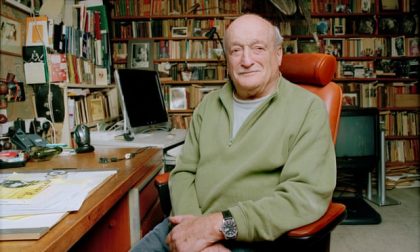‘Biggest Game in Town’ Author Al Alvarez Passes at 90
The poker world has been saddened to learn of the passing of Al Alvarez, the English writer, poet and critic who gave poker one of its seminal non-fiction works, The Biggest Game in Town. The 1983 book gave the literary public its first significant look inside the high-stakes poker world, bringing to life many of the game’s most historic characters, from Doyle Brunson and “Treetop” Jack Strauss to Amarillo Slim Preston and Stuey Ungar. Alvarez died at age 90 at his home in London on Monday, after battling viral pneumonia.
Alvarez, a long-time participant in poker home games in England, brought his exceptional writer’s eye to Las Vegas for the 1981 World Series of Poker, with the following year’s Biggest Game the eventual result. “There are two types of poker books,” wrote Alvarez at one point, “the how-to … and the autobiographical.” Alvarez, though, created the third literary poker canon with the release of The Biggest Game in Town, that of poker as a unique social construct and lens into the human character — or at least a slice of it never truly presented that way before.
In doing so, Alvarez blazed the trails for other such books, notably including Anthony Holden’s 1990 book Big Deal: A Year as a Professional Poker Player and James McManus‘s 2001 effort Positively Fifth Street: Murderers, Cheetahs, and Binion’s World. In announcing Alvarez’z passing on Facebook, McManus wrote, “[The book] inspired many thousands of amateurs to play in that tournament, and quite a few journalists, from his close friend Anthony Holden on, to enter and cover it. I’m grateful to have known him a little and read him a lot.”
Alvarez’s Biggest Game wasn’t his only dalliance with poker; he also served up the 2001 effort Poker: Bets, Bluffs, and Bad Beats and returned to the game again in 2007’s Risky Business: People, Pastimes, Poker and Books.
However, Alvarez’s name had long been etched in literary stone before the poker world received his attention. Alvarez served as the poetry editor and critic for The Observer for a decade beginning in 1956, in the process making his mark by championing what was termed the “new poetry”, a rather sharp attack on “genteel” British poetic tradition. In addition to his own work he helped launch the careers of other poets, including Robert Lowell and Sylvia Plath, through several anthologies. Alvarez and Plath both went through deeply troubled times, and while Alvarez survived his own suicide attempt, Plath did not survive hers. Outside of her immediate family, Alvarez was one of the last people to see the gifted Plath alive, listening to her read her troubled poetry in several mentoring sessions.
All that turmoil later emerged in Alvarez’s 1972 effort The Savage God: A Study of Suicide. In Alvarez’s very personal style, as his obituary in The Guardian noted, it combined “acute critical intelligence and raw personal experience.” The Savage God became one of the most preeminent books on what was and remains a very taboo subject, made even more raw by his retelling of his own and Plath’s experiences.
That willingness to get personal with risky subject matter made Alvarez a prominent part of the literary new wave, and it was to poker’s great benefit that he just happened to be an ardent fan of the game. In doing so, he helped make poker more accessible to the masses and, in the long run, contributed to the poker’s lasting growth.





















COMMENTS